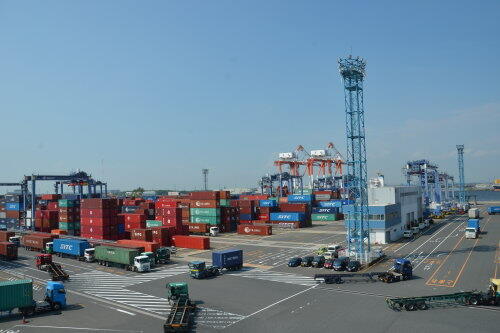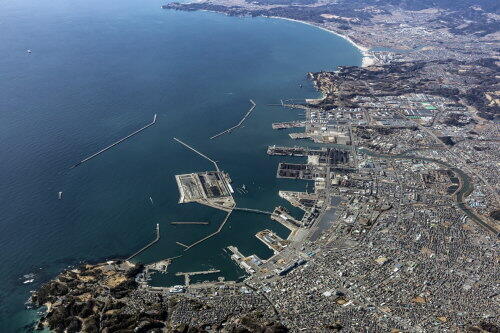Toyota Tsusho to Conduct Feasibility Studies toward the Development of Hydrogen Utilization Model at the Port of Nagoya and the Port of Onahama
- Contributing to the realization of carbon neutrality by promoting the decarbonization of ports -
- other
2022-01-11
Toyota Tsusho Corporation ("Toyota Tsusho") has been selected by the New Energy and Industrial Technology Development Organization ("NEDO")*1 to take part in the research projects entitled "Feasibility study on the development of a hydrogen utilization model at and in the area around the Port of Nagoya" and "Feasibility study toward the development of an FC model for logistics and people flow in a suburban city around the Port of Onahama."
Starting from January 2022, we will begin the studies ("the projects") at the Port of Nagoya in Aichi Prefecture and the Port of Onahama in Fukushima Prefecture, for the development of a hydrogen utilization model, including the use of hydrogen fuel cells ("FCs") for port equipment and mobility at the ports and surrounding areas.
1. Background
While more than 120 countries and regions around the world have set the goal of achieving carbon neutrality by 2050, Japan has also announced that it will reduce greenhouse gas ("GHG") emissions by 46% from the 2013 level by 2030 and become carbon neutral by 2050.
In the Green Growth Strategy, the industrial policy to encourage companies to take action, 14 key fields*2 have been specified as areas where efforts to reduce GHG emissions are considered essential, including industries related to energy, transportation, and manufacturing.
As ports are a key hub for "logistics, people flow, and civil engineering infrastructure," one of the 14 key fields, several measures are being taken to create carbon neutral ports ("CNPs") that use hydrogen and other clean energy to eliminate GHG emissions as a whole, with the goal of achieving carbon neutrality in ports and harbors by 2050.
2. Overview of the Project
Toyota Tsusho is aiming to establish CNPs through the development of a hydrogen utilization model in collaboration with partner companies at the Port of Nagoya with one of the largest cargo volume handled in Japan, and the Port of Onahama, a major energy supply base in the eastern Japan, by utilizing the knowledge gained through the efforts toward carbon neutrality at ports, which have been implemented at the Port of Los Angeles in the United States and the Port of Immingham in the United Kingdom.
- Feasibility study on the development of a hydrogen utilization model at and in the area around the Port of Nagoya
|
Features of the Port of Nagoya
|
- Largest domestic port in terms of cargo volume handled, with high potential for reducing GHG emissions through the use of FCs for cargo handling machinery, mobility, etc. |
|---|---|
|
Study topics
|
- Feasibility study on the use of FCs for port handling equipment, large trucks, forklifts, and public transportation at and around the Port of Nagoya |
|
Study period
(schedule) |
January 2022 to February 2023 |
|
Participating companies
|
Toyota Tsusho Corporation, Toyota Industries Corporation, Toho Gas Co., Ltd., Nagoya-Yokkaichi International Port Corporation, Japan Environment Systems Co., Ltd. |
- Feasibility study toward the development of an FC model for logistics and people flow in a suburban city around the Port of Onahama
|
Features of the Port of Onahama
|
- Iwaki City has been active in energy conversion and has introduced more than 100 FCEV "MIRAI" vehicles under the private sector initiative |
|---|---|
|
Study topics
|
- Study on the feasibility and hydrogen demand potential of FCs for trucks carrying biomass chips and other fuels between warehouses and for logistics trucks, buses, and taxies in the areas surrounding the Port of Onahama. |
|
Study period
(schedule) |
January 2022 to February 2023 |
|
Participating companies
|
Toyota Tsusho Corporation, Iwaki Battery Valley Promotion Organization, Japan Environment Systems Co., Ltd. |
The Toyota Tsusho Group will continue contributing to the transition to a decarbonized society by accelerating businesses that reduce GHG emissions throughout the industrial life cycle and promoting initiatives for achieving carbon neutrality.


*1 Determination on the implementation structure for NEDO's Project for Development of Technologies to Establish a Hydrogen Society/Development of Regional Hydrogen Utilization Technology
https://www.nedo.go.jp/koubo/SE3_100001_00009.html
*2 14 key fields of the Green Growth Strategy
https://www.meti.go.jp/english/press/2021/0618_002.html
|
Energy related industries
|
1. Offshore wind, 2. Fuel ammonia, 3. Hydrogen, 4. Nuclear power |
|---|---|
|
Transport/manufacturing industries
|
5. Automobile, storage batteries, 6. Semiconductors/ Information and Communication, 7. Shipping, 8. Logistics, people flow, and civil engineering infrastructure, 9. Food, agriculture, forestry and fishery, 10. Aircraft, 11. Carbon recycling |
|
Home/office related industries
|
12. Housing/building and next-generation electric power management, 13. Resource circulation, 14. Lifestyle-related |
[Initiatives by Toyota Tsusho]
October 14, 2020 announcement: Toyota Tsusho to Conduct Feasibility Study into Local Production for Local Consumption of Hydrogen- Seeking to use fuel cells in large-scale machinery at the Port of Los Angeles
(https://www.toyota-tsusho.com/english/press/detail/201014_004696.html)
October 5, 2021 announcement: Decarbonization Project Using Hydrogen at Immingham Port in the U.K. Starts
(https://www.toyota-tsusho.com/english/press/detail/211005_004900.html)
December 21, 2021 announcement: Toyota Tsusho to Start the World's First Long-term Operation Implementation Demonstration Project for the Local Production for Local Consumption of Hydrogen at the Port of Los Angeles in the United States
(https://www.toyota-tsusho.com/english/press/detail/211221_004955.html)
The information in this release is current as of the date of announcement.
Please note that information may change after the date of announcement. Thank you in advance for your understanding.
